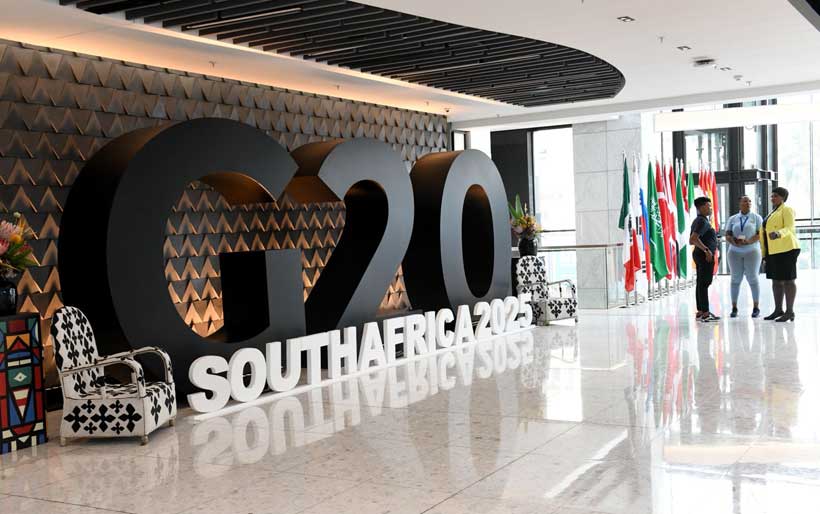The decision by the United States to boycott the upcoming G20 Foreign Ministers’ Meeting in Johannesburg has significant diplomatic and geopolitical implications. This move highlights growing tensions between Washington and Pretoria, fueled by differences over global governance, international legal institutions, and Middle Eastern geopolitics. Both the International Criminal Court (ICC) and the International Court of Justice (ICJ) have taken legal action against Israel, a key ally of the United States. It has emerged as a major critic of U.S. foreign policy as a result of South Africa’s opposition to Israel’s policies, leading to heightened tensions within global forums such as the G20.
Under the current President Donald Trump, the U.S. adopted an “America First” foreign policy, which prioritizes national sovereignty over global cooperation. This approach is rooted in the belief that international institutions—including those governing trade, security, and human rights—often function at the expense of American interests. According to Trump, organizations like the World Trade Organization (WTO), the United Nations (UN), and particularly the International Criminal Court target the U.S. and its allies disproportionately while failing to address broader global issues.
One of the primary sources of friction between Washington and Pretoria has been the ICC’s investigations into alleged war crimes committed by the U.S. and its allies, including Israel. The Trump administration previously imposed sanctions on ICC officials when the court attempted to investigate U.S. military actions in Afghanistan. These sanctions were lifted under President Joe Biden, who expressed support for ICC prosecutions related to Russia’s invasion of Ukraine. However, the situation changed when the ICC issued an arrest warrant for Israeli Prime Minister Benjamin Netanyahu, accusing him of committing war crimes in Gaza.
South Africa played a leading role in initiating this case against Israel, further escalating tensions with Washington. The U.S. Congress reacted strongly, viewing the ICC’s actions as an attack on its closest Middle Eastern ally. In retaliation, several American lawmakers pushed for new sanctions against the ICC, arguing that the court was engaging in politically motivated prosecutions.
South Africa’s Legal Challenge Against Israel and U.S. Backlash
Beyond the ICC’s actions, South Africa also launched a case against Israel at the ICJ, accusing it of committing genocide in Gaza. The ICJ, the principal judicial organ of the UN, agreed to hear the case, further straining relations between Pretoria and Washington. This move positioned South Africa as one of the most vocal critics of Israeli policies on the global stage, aligning itself with Global South nations and pro-Palestinian movements.
On January 31, 2024, South Africa and Malaysia jointly initiated a diplomatic campaign to uphold ICC and ICJ rulings, calling on other nations to recognize and enforce these legal decisions. The U.S., in contrast, attempted to undermine these rulings, leading to a diplomatic standoff between Washington and Pretoria. The increasing divergence in their foreign policy priorities has created a rift between the U.S. and South Africa, with broader implications for international diplomacy.
In response to the ongoing tensions, U.S. Secretary of State Marco Rubio announced via Twitter that he would not attend the G20 Foreign Ministers’ Meeting in Johannesburg. This decision marks a significant diplomatic boycott by the United States, signaling its discontent with South Africa’s stance on Israel and the ICC.
This move aligns with broader patterns in U.S. foreign policy, particularly under Trump, who has frequently sought to challenge the relevance of multilateral institutions when they conflict with American strategic interests. During his first term (2017–2021), Trump pushed to reshape G20 discussions, advocating for “reciprocal trade” instead of free trade and opposing global climate agreements. It seems that his approach to the G20 and other international organizations could become even more radical and isolationist.
Economic and Diplomatic Consequences for U.S.-South Africa Relations
The U.S. boycott of the G20 meeting is not merely symbolic—it carries tangible economic and diplomatic consequences. Trump and his allies have been increasingly critical of South Africa’s domestic policies, particularly regarding land reform and racial issues. Trump has previously accused South Africa of engaging in “land grabbing” against white farmers, echoing narratives promoted by right-wing groups. These accusations have also been amplified by figures such as Elon Musk, a South African-born billionaire, who has publicly criticized Pretoria’s policies.
Additionally, the U.S. has started to cut financial aid to South Africa, citing concerns over governance and foreign policy disagreements. This move is likely to weaken U.S.-South Africa relations further, pushing Pretoria closer to China, Russia, and other BRICS nations. The growing alignment of South Africa with alternative global governance structures reflects a larger shift in global power dynamics, where nations in the Global South seek to counterbalance Western influence.
The G20 is a critical platform for global economic cooperation, bringing together the world’s largest economies to discuss pressing international challenges. The U.S. decision to boycott the foreign ministers’ meeting raises serious concerns about the future cohesion of the G20. Historically, the group has played a vital role in stabilizing global financial markets, coordinating economic policy, and addressing geopolitical crises. However, when a major member like the U.S. withdraws from its proceedings, it undermines the institution’s legitimacy and effectiveness.
